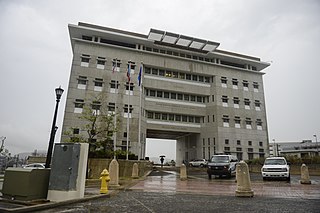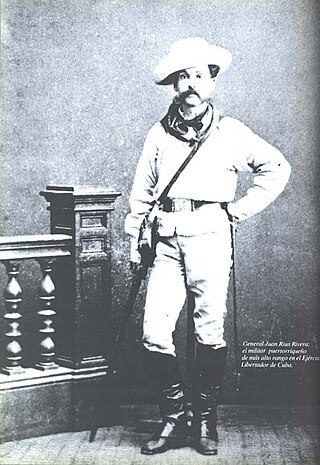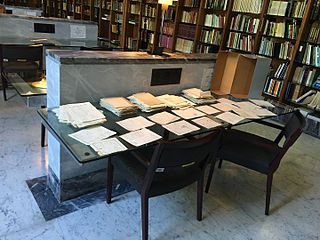Related Research Articles

Caguas is a city and municipality in central eastern Puerto Rico. Located in the eponymous Caguas Valley between the Sierra de Cayey and Sierra de Luquillo of the Central Mountain Range, it is bordered by San Juan and Trujillo Alto to the north, Gurabo and San Lorenzo to the west, Aguas Buenas, Cidra and Cayey to the east, and Patillas to the south. With a population of 127,244 as of the 2020 census, Caguas is the fifth most populated municipality in the archipelago and island and a principal city of the San Juan metropolitan area.

El Nuevo Día is the newspaper with the largest circulation in Puerto Rico. It is considered mainstream and the territory's newspaper of record. It was founded in 1909 in Ponce, Puerto Rico, and today it is a subsidiary of GFR Media. Its headquarters are in Guaynabo, Puerto Rico.

Alejandro Tapia y Rivera was a Puerto Rican poet, playwright, essayist and writer. Tapia is considered to be the father of Puerto Rican literature and as the person who has contributed the most to the cultural advancement of Puerto Rico's literature. In addition to his writing, he was also an abolitionist and a women's rights advocate.

Puerto Rican literature is the body of literature produced by writers of Puerto Rican descent. It evolved from the art of oral storytelling. Written works by the indigenous inhabitants of Puerto Rico were originally prohibited and repressed by the Spanish colonial government.

General Juan Rius Rivera, was the soldier and revolutionary leader from Puerto Rico to have reached the highest military rank in the Cuban Liberation Army and to hold Cuban ministerial offices after independence. In his later year, he also became a successful businessperson in Honduras.

The University of Puerto Rico School of Law is a law school in Puerto Rico. It is one of the professional graduate schools of University of Puerto Rico, Río Piedras Campus, the only law school in the University of Puerto Rico System and the only public law school in Puerto Rico. It was founded in 1913 at its present site in Río Piedras, which at the time was an independent municipality and is now part of the City of San Juan. The School of Law has been accredited by the American Bar Association since 1945 and by the Association of American Law Schools since 1948.

The history of Puerto Rico began with the settlement of the Ortoiroid people before 430 BC. At the time of Christopher Columbus's arrival in the New World in 1493, the dominant indigenous culture was that of the Taíno. The Taíno people's numbers went dangerously low during the latter half of the 16th century because of new infectious diseases carried by Europeans, exploitation by Spanish settlers, and warfare.

The history of the Jews in Puerto Rico dates back to the 1400s. Jewish immigration to Puerto Rico began in the 15th century with the arrival of the anusim who accompanied Christopher Columbus on his second voyage. An open Jewish community did not flourish in the colony because Judaism was prohibited by the Spanish Inquisition. However, many migrated to mountainous parts of the island, far from the central power of San Juan, and continued to self-identify as Jews and practice Crypto-Judaism.

The Instituto de Cultura Puertorriqueña, or ICP for short, is an institution of the Government of Puerto Rico responsible for the establishment of the cultural policies required in order to study, preserve, promote, enrich, and diffuse the cultural values of Puerto Rico. Since October 1992, its headquarters have been located at the site of the old colonial Spanish Welfare House in Old San Juan.

Leopoldo Figueroa a.k.a. "The deacon of the Puerto Rican Legislature", was a Puerto Rican politician, journalist, medical doctor and lawyer. Figueroa, who began his political career as an advocate of Puerto Rican Independence, was the co-founder of the "Independence Association", one of three political organizations which merged to form the Puerto Rican Nationalist Party. Figueroa, had changed political ideals and in 1948, was a member of the Partido Estadista Puertorriqueño. That year, he was the only member of the Puerto Rico House of Representatives who did not belong to the Partido Popular Democrático (PPD), and the only Representative to oppose the PPD's approval of what became known as the Ley de la Mordaza, which violated the civil rights of those who favored Puerto Rican Independence. On December 22, 2006, the Puerto Rican Legislature approved a law declaring every September 21, Leopoldo Figueroa Carreras Day.
The Secretary of Justice of Puerto Rico is the chief legal officer and the attorney general of the government of Puerto Rico. The Secretary of Justice is second in line of succession to the governorship of Puerto Rico.

The Puerto Rico National Library is the national library of Puerto Rico. It was created in 1967 as the Biblioteca General de Puerto Rico by Joint Resolution No. 44 of the Puerto Rico Legislature. It opened on April 11, 1973. In 2003 it was renamed Biblioteca Nacional de Puerto Rico by Act 188 of August 17 of that year. The library is ascribed to the Institute of Puerto Rican Culture.

Gladys Esther Tormes González is a historian and head archivist of the Archivo Histórico de Ponce, in Ponce, Puerto Rico. Serving since 1974, she is the longest-serving archivist in the municipality of Ponce.
Jesús Omar Rivera Dávila, better known as El Boricuazo, is a Puerto Rican media personality, writer, tour guide, college instructor, and public speaker from Bayamón. Rivera is known for his appearances on Puerto Rican television and radio, where he offers stories, facts, and trivia about Puerto Rico that are not well known to the general public.

The Archivo General de Puerto Rico, established in 1955, is an archive documenting the history and culture of Puerto Rico. The governmental Institute of Puerto Rican Culture began overseeing its operation in 1956. It is located in a building shared with the national library on Avenida Juan Ponce de León in San Juan. Among its collections is the "Fondo de Obras Publicas", formerly housed in the University of Puerto Rico's archives.

Segundo Cardona Colom FAIA is a Puerto Rican architect and developer. His work has been recognized by the American Institute of Architects (AIA), by the Colegio de Arquitectos y Arquitectos Paisajistas de Puerto Rico as well as by the International Union of Architects. In 2006 Cardona was elected as Fellow of the American Institute of Architects. In 1992, he was awarded the Henry Klumb Award.
References
- ↑ "El Archivo General de Puerto Rico". EnciclopediaPR (in Spanish). 2020-10-10. Retrieved 2021-06-20.